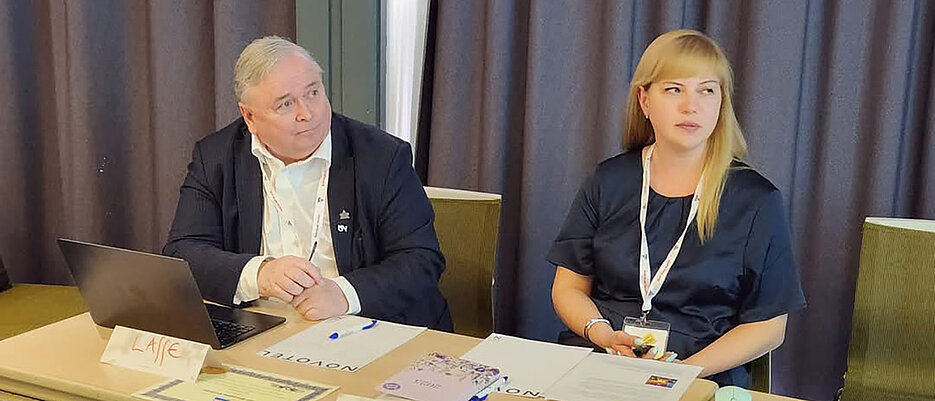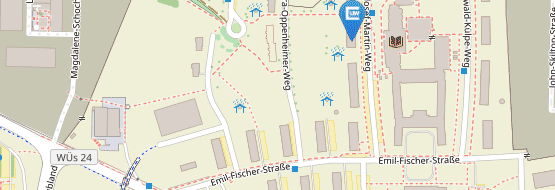Awarded Paper at the Digital World Congress 2025: Exploring the Future of Education and Technology
10.06.2025PD Dr. Nataliia Lazebna, education manager and leader of work package 12 in the CHARM-EU Project and her co-author Kateryna Lut published their paper "Hybrid Harbors as Immersive Learning Spaces for Unsafe Regions" in the IARIA open access ThinkMind digital Library and presented her work at the conference. The paper was awarded "Best Paper" on the eLmL 2025.

From May 18–22, 2025, educators, researchers, and technologists gathered in Nice, France, for Digital World Congress 2025, a forward-looking conference focused on the impact of digital technologies on human health, education, and society. Organized by the International Academy, Research, and Industry Association (IARIA), the pioneers of the Open Access, the event featured a rich program of thematic discussions and research presentations, offering valuable insights for teachers navigating the evolving digital landscape.
The paper Hybrid Harbors as Immersive Learning Spaces for Unsafe Regions by the member of the Centre for Teaching and Learning (Julius-Maximilian-Universität Würzburg), PD Dr. Nataliia Lazebna, Education Manager and Work Package 12 Leader in CHARM-EU Project was selected for the publication in the IARIA open access ThinkMind digital Library and presentation at the conference. Thanks to the support and funding provided by the Centre for Teaching and Learning, the paper was presented and published. The study (co-authored with Dr. Kateryna Lut from National University “Zaporizhzhia Polytechnic”, Ukraine) explores the technological and anthropocentric challenges and solutions associated with hybrid-format learning in an unsafe region (Ukraine). The paper is based on the experiences gained during hybrid seminars on Teaching English as a Foreign Language (2022/2023) for student teachers from Germany’s Julius-Maximilians-Universität Würzburg and Ukraine’s National University “Zaporizhzhia Polytechnic”. Technological limitations, solutions at-hand, and perspectives for further development of “hybrid harbors” based on the Activity-Centered Analysis and Design are considered (ThinkMind(TM) Digital Library).
Teaching in Tech Times
N. Lazebna also contributed to the Open Discussion on Dilemma between Education and Preparedness in Digital Space together with Prof. Dr. Petre Dini from USA/EU, the organizer of the Congress, and Prof. Dr. Lasse Berntzen, University of South-Eastern Norway, Norway. This session meaningfully contributes to the ongoing implementation of Work Package 12 (WP12) within the CHARM-EU Project, where JMU occupies the leading role. WP 12 focuses on professional development and educational research.
By addressing the evolving challenges and opportunities in digital education, the session lays the groundwork for deeper institutional engagement and innovation. Key issues explored included the tension between students’ digital fluency and their increasing reliance on AI, as well as the educator’s role in balancing technological tools with human-centered learning approaches.
Discussions also highlighted the importance of equipping graduates with foundational digital and AI literacy, including data literacy and an understanding of AI ethics. The session also examined the use of immersive tools in education, emphasizing the need for a clear pedagogical focus, the promotion of ethical awareness in digital environments, and the safeguarding of students’ emotional well-being—particularly when comparing immersive rooms to VR goggles.
To address institutional barriers such as rigid curricula and reward systems that often prioritize research output over teaching excellence, the session proposed the Scholarship of Teaching and Learning (SoTL) as a transformative approach. SoTL encourages a shift in perspective, viewing the teacher as a “gardener” who cultivates learning through reflection, innovation, and care. Notably, that SoTL is being implemented as a new research subgroup focus in WP 12, and has also been discussed during a recent World Café on Educational Research for European University Alliances (Online World Café on Educational Research - CHARM-EU).
Finally, the session emphasized the importance of embedding faculty development into institutional practice. This includes providing mandatory support and assessment, fostering a culture of collaboration and innovation, and ensuring that professional development opportunities are accessible and impactful. Together, these insights support the broader goals of WP12 by promoting a sustainable, inclusive, and forward-thinking approach to academic development across CHARM-EU institutions.
Smart Highlights
The invaluable insights were gained during the Congress and included such key themes as digital technologies and human health, education in the digital age, virtual vs. physical spaces, sensor technology and sustainability. Highlights from the sessions included:
-
A pilot study from Estonia examining student perspectives on privacy and security in smart campuses, presented by Kate Riin-Kont from the Estonian Academy of Security Sciences.
-
AI-enhanced safety education and ethical risk assessments in collaborative tech development, presented by researchers from Norway (Prof. Dr. Lasse Berntzen, University of South-Eastern Norway) and the Netherlands (Dr. Mohammad Rajabalinejad, University of Twente).
-
Innovative approaches to online learning, such as avatar-based environments to combat Zoom fatigue (Prof. Dr. Gerhard Hube, Technical University of Applied Sciences Würzburg-Schweinfurt, Germany) and video-based discussions to boost engagement and critical thinking (Prof. Dr. Daniel Farr, Kennesaw State University, Georgia, United States).
-
A focus on inclusive education, with strategies like “learning by doing” to close achievement gaps and support diverse learners (Dr. Rachel Van Campenhout, VitalSource, USA).
The conference highlighted the importance of thoughtful, ethical, and inclusive integration of technology in education. For teachers, it offered both inspiration and practical strategies to adapt to the digital future while keeping student well-being and equity at the forefront. These insights directly support the goals of Work Package 12 (WP12) in the CHARM-EU project, which emphasizes professional development and educational research. By addressing challenges such as digital fluency, AI ethics, and immersive learning, the event reinforced the need for institutional change and continuous faculty support. Ultimately, it highlighted the value of embedding innovation and reflective teaching practices into the heart of higher education.
By PD Dr. Nataliia Lazebna


